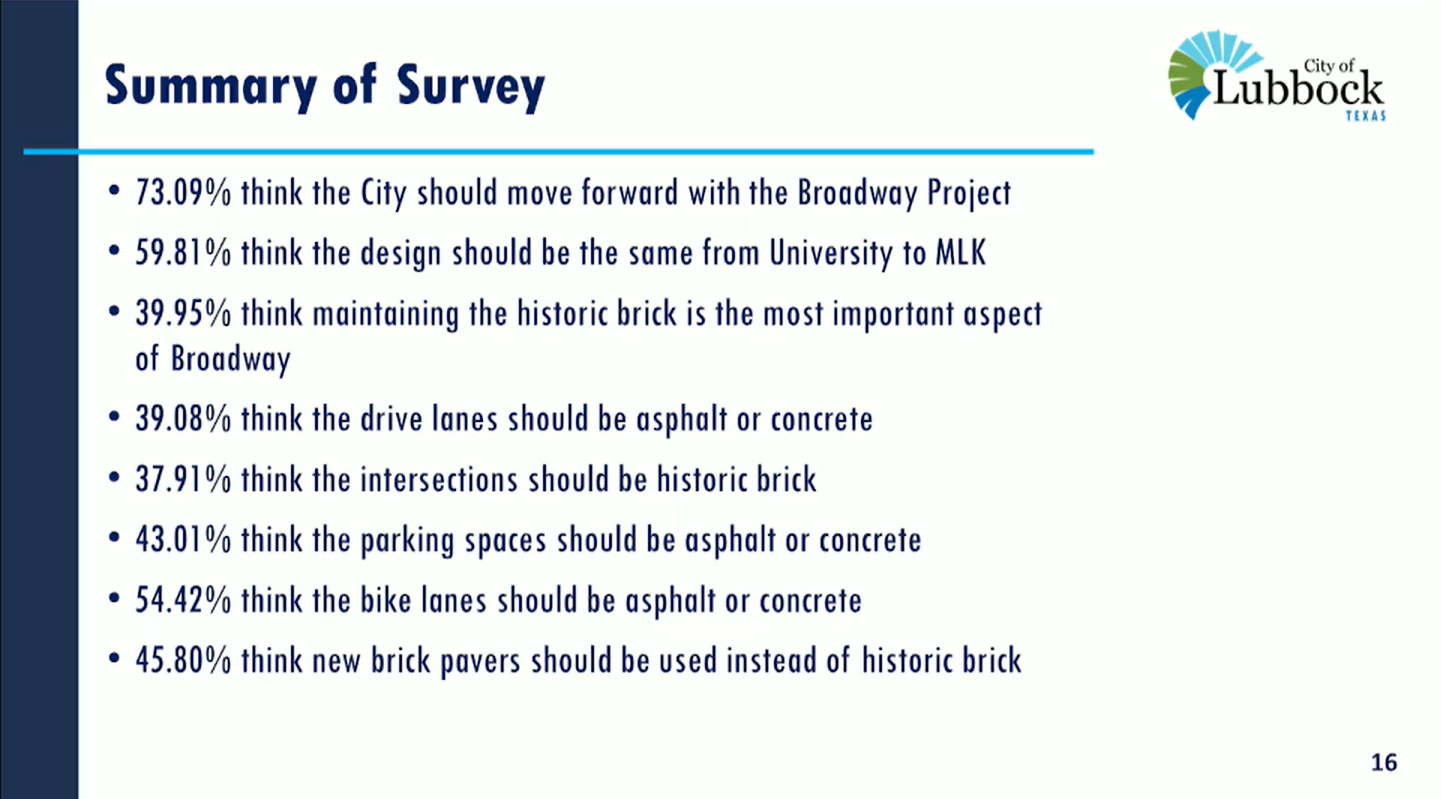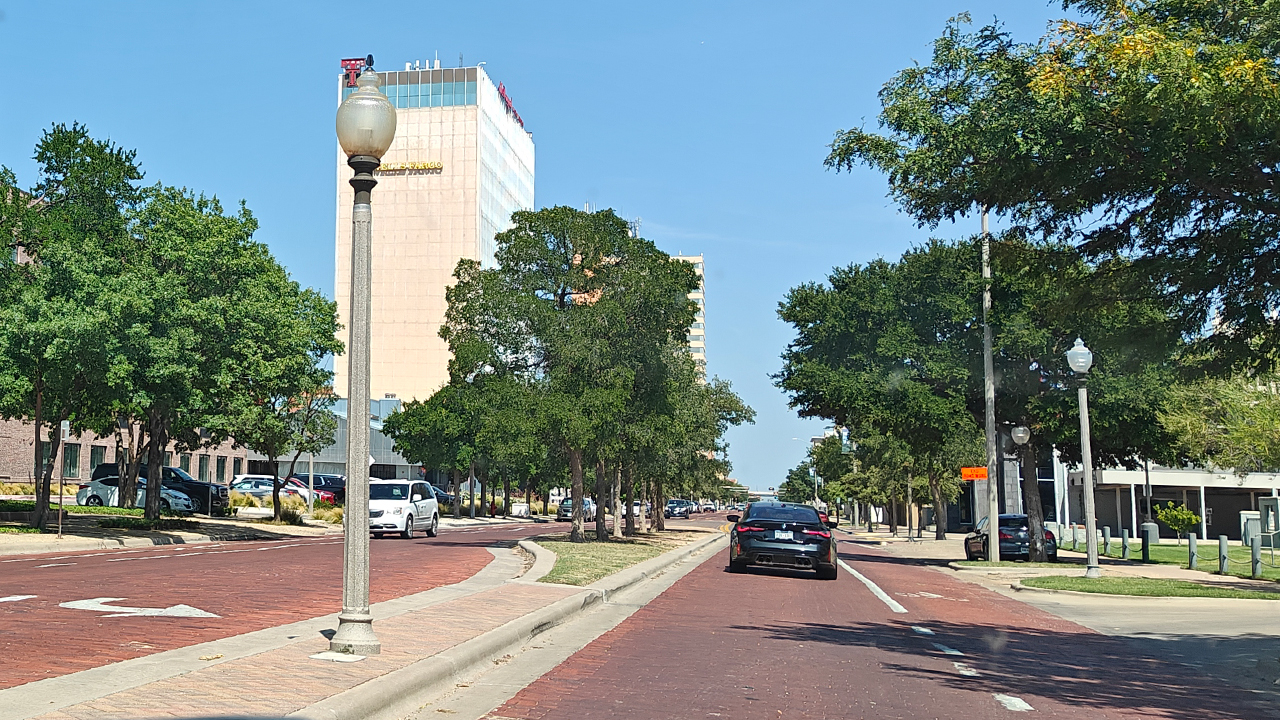1600 block of Broadway
Broadway’s once-protected historic bricks may be kicked to the curb – so to speak – if a committee’s recommendation is accepted on a proposed road bond expected on November’s ballot.
The bond is now $110 million – down from what could have been $163 million.
A Citizens Advisory Committee will present the idea Wednesday to the City Council. The committee thinks the actual cost is $100 million but added $10 million for inflation over five years.
The biggest item is a controversial $16 million recommendation for Broadway from Avenue Q to Avenue E, saying the city should ditch the historic bricks on Broadway from Q to E.
Driving lanes should be concrete, the committee said, and the intersections should be “brick pavers,” materials that look like bricks – often made from clay or dyed concrete.
“All historic brick removed from Broadway should be cleaned, [stored] and given to the City of Lubbock for a future application, potentially the segment from University to Avenue Q,” the committee said.
Mary Crites, a Lubbock architect, wants to preserve the historic brick streets, arguing protections for the bricks should be followed even if the city mistakenly deleted them recently.
She plans to speak against the proposal Wednesday at 2 p.m. during a public comment period at the City Council, which comes before the advisory committee’s presentation.
The committee’s proposal
The committee started with leftover projects from the 2022 bond discussions. A $200 million bond passed that year, but plenty was left out.
The current proposal both dropped and added items. For example, Broadway from Q to University is not on the list. But Alcove Avenue from 50th to 66th is.
Recommendation list:
- Broadway from Ave Q to Ave E: $16 million
- University Avenue from 50th St. to South Loop 289: $7.1 million
- Upland Avenue from 98th St. to 114th St.: $15.6 million
- 34th Street from Upland Ave. to Alcove Ave.: $13.6 million
- 146th Street from University Ave. to Ave. P: $14.6 million
- Quaker Avenue from 4th St. to 19th St.: $3.1 million
- 146th Street from Slide Road to Quaker Ave.: $15.3 million
- Avenue P from 130th St. to 146th St.: $11.2 million
- Alcove Avenue from 50th St. to 66th St.: $1.5 million
- South Overton, rebuild streets (asphalt portions): $2 million
You can compare this list with the previous version by clicking here to see our coverage from mid-July.
A copy of the recommendations was posted recently to the city’s website as part of the Council’s meeting agenda for Wednesday.
The committee’s recommendations said, “Priority growth-driven projects have been identified with safety in mind.” School traffic was mentioned.
Other items included:
- City should increase money for street maintenance.
- City should complete utility line replacements beneath Broadway.
- City should annex certain areas along priority corridors (Quaker Avenue south of 146th St., University Avenue south of 130th St. and 146th Street between Indiana and University).
- A regular cycle of bond elections for roadway projects.
The committee thought a privately funded political action committee is a good idea for promoting the bond. The plan is a single proposition on the November ballot – not splitting it up into separate items.
Back in 2022, a $200 million bond (twice the size of this one) was going to increase the property tax rate no more than 2.6 cents or $16 per year for the average Lubbock homeowner.
Officials have not yet said how much the current bond will impact tax rates. The taxable value of homes went up since then and interest rates on the bonds won’t necessarily be the same.
Back to the bricks
Up until last year, the city had legal protection for the brick streets. When the city adopted the Uniform Development Code in October, those protections got left behind in an “oversight,” city officials claimed.
Crites help negotiate those protections over the years – the most recent were approved by the City Council in August 2020. The proposal to kick bricks to the curb, she said, is not “an example of open government.”
“This would not meet the brick street ordinance if it hadn’t been deleted by mistake,” Crites said.
Crites spoke publicly on July 25 – one day before the committee’s final meeting. She said the ordinance to protect brick streets was repealed without public notice or debate. For that reason, she thinks the city should act as if the protections remained in place.
The committee saw things differently.
“The city has completed the public and stakeholder input needed for Broadway and it is time to begin to address Broadway,” the committee said – adding the needs “exceed the amount the committee can recommend.”
The input included a public survey last year. (See the results in the image below.) Less than 40 percent of those in the survey thought keeping historic brick was the most important aspect of Broadway.

The bricks complicate things financially, the committee said.
“Council could opt to swap brick pavers for historic brick in intersections for an additional $3 million cost,” the committee recommendation said.
The city manager began laying the groundwork a year ago (in July 2023) for modern paving on Broadway but using historic bricks or modern brick pavers in the intersections “to highlight the historic aspect of the corridor.”
The city has a board to oversee the Central Business District (CBD) taxing zone. The TIF in 2023 also recommended using concrete or asphalt for the main lanes of Broadway because of cost. Historic bricks could be used at key intersections.
“We believe this will have citizen buy-in because it honors the history of the street without overspending, and it allows for more reasonable maintenance,” a CBD presentation said.
Lubbock’s Urban Design and Historic Preservation Commission disagreed at that time and wanted to preserve as much of the historic brick as possible.
Comment, react or share on our Facebook post.


 Facebook
Facebook